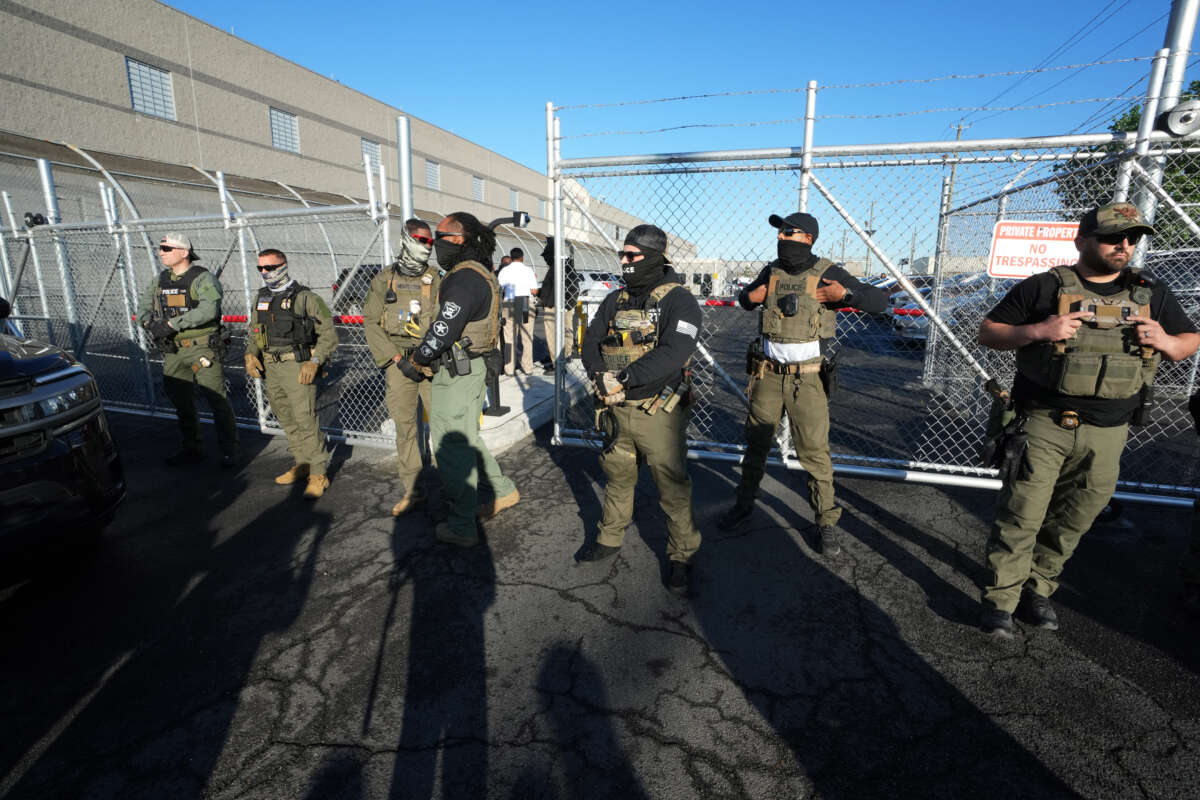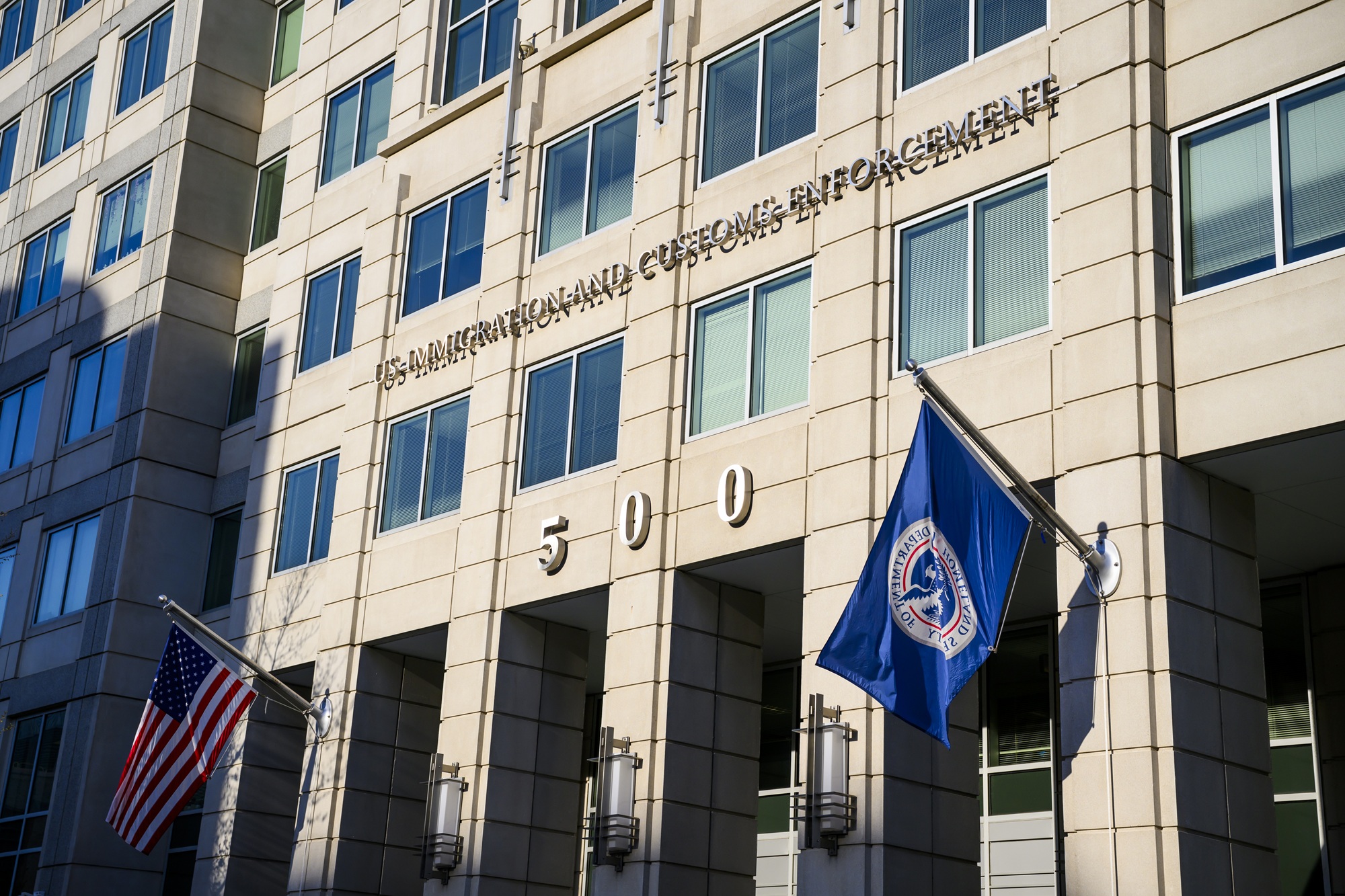Everything Beagle
Local Trans Icon
- Joined
- Mar 14, 2023
- Messages
- 5,754
- Likes
- 7,712
- Points
- 113

In Earnings Calls, Private Prison Executives Revel in Profiting Off ICE Arrests
“Our business is perfectly aligned with the demands of this moment,” CoreCivic CEO Damon Hininger said on the call.
In Earnings Calls, Private Prison Executives Revel in Profiting Off ICE Arrests
Eliza Dewey
9–12 minutes
During a second-quarter earnings call in August, an executive with the GEO Group ticked off a list of the private prison company’s accomplishments so far this year. These included securing contracts with Immigration and Customs Enforcement (ICE) for expanded immigrant detention centers in New Jersey, Michigan, Georgia, and California; working to convert six facilities — most of them former prisons — into ICE detention sites; and making moves to cash in on detention operations at military sites.
“All of these efforts are aimed at placing our company in the best competitive position possible to pursue what we continue to believe are unprecedented growth opportunities,” George Zoley, the executive chair of the GEO Group board, told investors and other stakeholders attending the Aug. 6 call, according to audio and call transcripts from the online investment research website, Seeking Alpha.
Executives at CoreCivic, another major for-profit prison company, were equally upbeat in their earnings call that same month.
“Our business is perfectly aligned with the demands of this moment,” CEO Damon Hininger said on the Aug. 7 call. “We are in an unprecedented environment with rapid increases in federal detention populations nationwide and a continuing need for solutions we provide.”
In some sense, the cheerfulness was not surprising. The day after President Donald Trump was elected to his second term, shares for GEO Group and CoreCivic jumped by double digits. Trump had repeatedly promised mass deportations on the campaign trail, and private prison companies were in place to reap the rewards, based on their longstanding role under both parties in detaining immigrants.
The earnings calls from the nation’s two largest private prison companies offer details about how big players in that industry are championing and profiting from Trump’s mass deportation agenda. GEO Group reported a total second-quarter revenue of $636.2 million, while CoreCivic reported $538.2 million, up 9.8% from the second quarter of last year, with third-quarter reports expected in early November.
“What they’re doing is heinous; there’s no other way to describe profiting off of human suffering,” said Paolo Almiron, media coordinator for the advocacy group Resistencia en Acción New Jersey.
Neither Zoley and the GEO Group nor Hininger and CoreCivic responded to a detailed list of questions on the allegations in this story, including about whether they had ethical or moral concerns about their business. ICE also did not respond to Prism’s request for comment.
Industry Acknowledgment of the Federal Arrest Quota
Multiple media outlets, as well as White House deputy chief of staff Stephen Miller, reported earlier this year that the Trump administration set a quota of 3,000 ICE arrests per day. That number supercharged the immigration raids that spread across the country this summer, resulting in the increased targeting of immigrants without a criminal record.In August, however, the Department of Justice denied that such a quota had ever existed.
But on the GEO Group earnings call this summer, these same quotas were described as common industry knowledge.
After Zoley described media reports that ICE wanted to increase its capacity to 100,000 beds by the end of this year, one participant on the call asked a follow-up question.
“Do you have a sense for the detention rate required to justify 100,000 detention beds?” he asked. “In other words, is it [that] 3,000 a day equals 100,000 beds?”
“It is that simple rule of thumb, as you described it,” Zoley responded, adding it was a model “that we’ve heard many times.”
“It was based on the objective of deporting a million people a year,” he said, clarifying that the quota was a “theoretical model” that would likely be affected by lawsuits.
No Mention of Poor Conditions
Leaders in both calls discussed how much money their companies have made from facilities that have made headlines for allegations of widespread abuse.Patrick Swindle, president and chief operating officer of CoreCivic, spoke about the company’s revival of the country’s largest immigration detention facility, located in Dilley, Texas.
“We are on schedule to complete full activation by the end of the third quarter, when we expect to generate the full fixed monthly revenue for the facility,” said Swindle, who did not respond to Prism’s request for comment.
The Dilley Immigration Processing Center, formally named the South Texas Family Residential Center, was first opened under former President Barack Obama in 2014, when it faced criticism from human rights advocates for detaining mothers and their children seeking asylum after crossing the border. It was closed last summer by former President Joe Biden’s administration, but Trump’s administration reopened it this spring.
Advocates who spoke with Prism described ongoing poor conditions at Dilley, including delayed medical care and the weaponization of “self-deportation” by federal agencies.
A mother and her child who were sent to Dilley in September after being swept up in an immigration sweep in a Chicago grocery store experienced this firsthand, according to immigrant advocacy group RAÍCES.
The woman had a severe ovarian cyst but was not given access to her normal medication while detained.
“She was at risk of bleeding out, and she was in significant pain throughout the course of her time at Dilley,” said Faisal Al-Juburi, RAÍCES’s chief external affairs officer.
The excruciating pain led her to agree on Oct. 10 to “self-deport,” a strategy that Trump has made a cornerstone of his second administration’s immigration crackdown.
Ten days later, the woman was still in detention without proper care for her cyst, according to Al-Juburi. He said ICE’s only response to repeated advocacy by his organization has been to confirm that she is being processed for removal.
Other media outlets have also covered complaints about delayed medical care at the Dilley facility, particularly for children, held for weeks or months without justification.
Meanwhile, those on the GEO Group earnings call spoke about the Delaney Hall detention center in New Jersey, which began holding immigrants in May. Zoley said the company’s contract at that site was “expected to generate in excess of $60 million in annualized revenues in the first full year of operations.”
The call did not include any mention of conditions at the center. Advocates told Prism about a range of ongoing concerns there.
“The spaces are extremely crowded, the food is in such bad state that people refuse to eat it, the water has a strange odor, and people are not given medical care until they are extremely sick,” said Almiron of Resistencia en Acción.
“Visiting schedules are irregular and are mostly spread through word of mouth,” Almiron added. “It’s only thanks to the work of local immigrant rights organizations that there’s at least an idea of when people can go and visit.”
Kathy O’Leary, New Jersey region coordinator for Catholic organization Pax Christi USA, stands watch outside Delaney Hall three to four times a week as part of a New Jersey coalition called Eyes on ICE.
“What we’re hearing is that people are going without food for 12 hours,” O’Leary said. “The food is coming frozen, moldy, otherwise spoiled, and in meager portions.”
Both advocates described a strict dress code that can keep visitors from seeing their loved ones. One woman traveled to Delaney Hall from Massachusetts to visit her family member, only to be told her jeans did not pass the dress code, O’Leary said. Eyes on ICE volunteers sitting outside the facility found a pair of pants for the woman to wear so that she could enter.
In June, detainees frustrated by inadequate food and overcrowding at the facility broke windows, doors, and security cameras while others made panicked phone calls to loved ones and attorneys outside the walls. Four men escaped through a weak exterior wall, and, ultimately, the facility was put on lockdown. The four men were re-arrested later.
Profiting Off Detention
Despite increasing anti-ICE protests across the country and viral videos of increasingly aggressive ICE arrests across social media, the second-quarter earnings calls in the private prison industry were business as usual.“Our financial performance, which has been pretty significant this year, only incorporates … a very small part of the opportunity that’s going to be, I think, near-term for us as we go to end of this year into 2026,” Hininger said.
The content of the calls isn’t necessarily shocking to immigrant advocates.
“At the end of the day, their priority is their bottom line for their shareholders,” Al-Juburi said. “This is what happens when we prioritize profits over people. Is it shocking? Yes. But is it surprising? No.”







